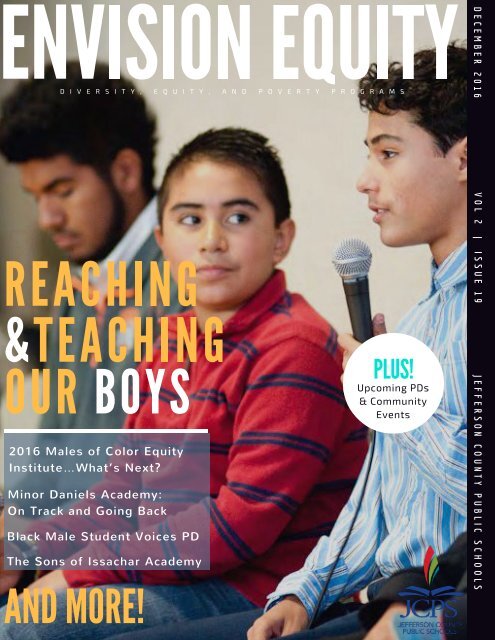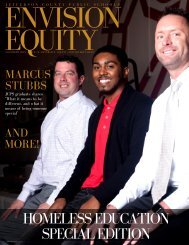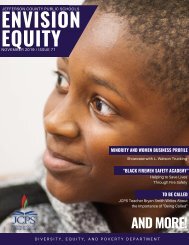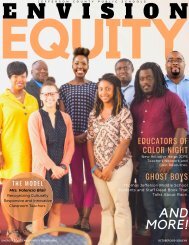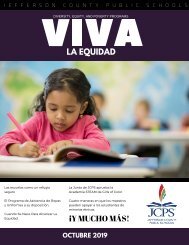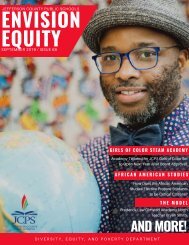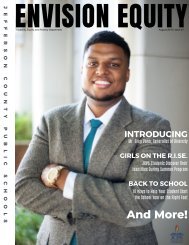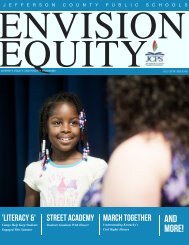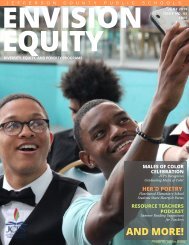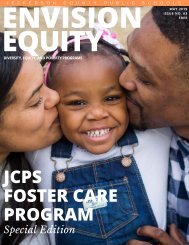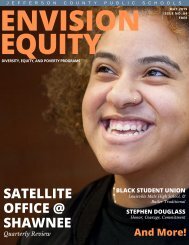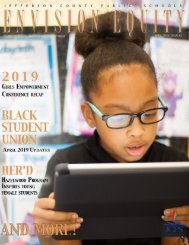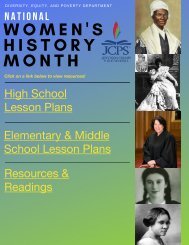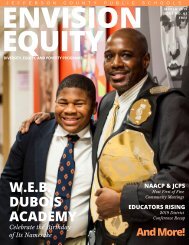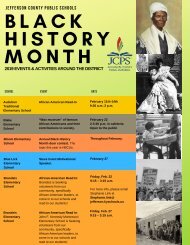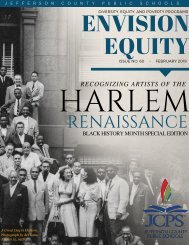Envision Equity - Special Edition: Reaching & Teaching Our Boys
You also want an ePaper? Increase the reach of your titles
YUMPU automatically turns print PDFs into web optimized ePapers that Google loves.
1<br />
Photo, Getty Images
Above, a JCPS teacher takes notes during the<br />
Black Male Student Voices PD.<br />
In their<br />
own words<br />
JCPS educators hear the voices of black male<br />
students during an innovative professional<br />
development training.<br />
By Kimberly Curry, Librarian—Indian Trial Elementary<br />
Photos, Abdul Sharif<br />
Recently, I had the opportunity to attend<br />
an insightful professional-development<br />
(PD) session entitled “Black Male<br />
Student Voices.” I signed up for this<br />
particular session because of my desire, as an<br />
educator, to develop stronger connections with<br />
all of my students. It has been my experience, in<br />
my eight years of teaching, that my male<br />
students, particularly my African-American<br />
males, have been my most challenging group to<br />
consistently maintain open communication with.<br />
Ironically, I am an African-American female with a<br />
son of my own, with whom I have a very close<br />
bond. I believed this PD would provide me with<br />
some insight and strategies that could help me<br />
begin to leap the connection hurdle, and I was<br />
not disappointed.<br />
2<br />
Continue on next page
For the two hours our<br />
session met, Dr. John<br />
Marshall really provided<br />
some insight on how our<br />
African-American male<br />
students think and feel<br />
about their educational<br />
experience. With a mixture<br />
of live accounts from the<br />
students themselves to<br />
riveting video that really<br />
made you think about your<br />
own biases, Dr. Marshall<br />
challenged us to consider<br />
how we as educators go<br />
about the process of<br />
engaging our students and<br />
how we need to hone in on their needs,<br />
stretching ourselves to meet them where they<br />
are and yet push them to new heights.<br />
Something I<br />
discovered<br />
about myself<br />
and my own<br />
biases was I had<br />
never really<br />
thought about<br />
the socioeconomic<br />
differences<br />
between me and<br />
my African-<br />
American<br />
students as a<br />
communication barrier. I have assumed that<br />
our shared race created an automatic mutual<br />
Above, a JCPS teacher takes notes during the<br />
Black Male Student Voices PD.<br />
Above, JCPS Chief <strong>Equity</strong> Officer, Dr. John Marshall<br />
speaks during the Black Male Student Voices PD.<br />
connection, and attending this class made me<br />
realize my students may not view this the<br />
same. Although I grew up in a single-parent<br />
home, my adult life is completely different.<br />
When my students<br />
see me, they do not<br />
see the struggles I<br />
had as a child; they<br />
see my professional<br />
persona. While it is<br />
a positive image to<br />
see, I am now<br />
mindful that I need<br />
to have more<br />
discussions with<br />
them about how I<br />
got to this point.<br />
Sharing my story<br />
could inspire them to reach for their own<br />
dreams.<br />
Continue on next page<br />
3
The most thought-provoking thing I learned<br />
was how early in their lives, African-American<br />
males start having a negative image of<br />
themselves. Dr. Marshall explained that many<br />
of them begin to have self-loathing thoughts<br />
about themselves as early as the age of four.<br />
As an elementary educator, this really<br />
resonated with me and caused me to reflect<br />
over previous classes and encounters with my<br />
Above, JCPS teacher Kimberly Curry listens during<br />
the Black Male Student Voices PD.<br />
students. It made me think of all the times<br />
when I have heard my students say “I’m bad,”<br />
or “She/He is bad.” When I hear such<br />
comments, I correct them by saying, “You are<br />
not bad; you’re just making a bad choice right<br />
now.” However, it makes me wonder how<br />
many people are consistently telling this child<br />
that he or<br />
she is bad?<br />
Who are<br />
these<br />
people?<br />
Peers?<br />
Parents?<br />
Other Above, JCPS teachers pose for photo<br />
after the Black Male Student Voices<br />
educators? PD.<br />
Society?<br />
How does a young mind stand a chance with<br />
“The most thought-provoking<br />
thing I learned was how early<br />
in their lives, African-American<br />
males start having a negative<br />
image of themselves.”<br />
all of this<br />
negativity?<br />
Even with all of<br />
these<br />
questions, I left<br />
that session<br />
with hope for<br />
the future. I<br />
am hopeful<br />
because Dr.<br />
Marshall helped us realize that the young men<br />
in our classroom need us and we cannot be<br />
afraid to step up to the task of educating<br />
them. In their own voices, many of them said<br />
they believe their teachers have the best<br />
intentions but just do not take the time to<br />
relate to<br />
them as<br />
individuals.<br />
After<br />
attending<br />
this session,<br />
I am more<br />
determined<br />
than ever to<br />
break that<br />
cycle. My<br />
highest<br />
Above, a JCPS teacher takes<br />
notes during the Black Male<br />
Student Voices PD.<br />
educational priority to become a more<br />
culturally aware educator to help all of my<br />
students, but particularly my African-<br />
American male students, become the most<br />
successful version of themselves that they can<br />
be.<br />
4
Above, a JCPS student is welcomed by<br />
Flash Dads at Wheatley Elementary<br />
Photo, Abdul Sharif<br />
Flash<br />
Dads<br />
Encouraging Students Who Need It Most<br />
By Abdul Sharif—Diversity, <strong>Equity</strong>, and Poverty<br />
Programs<br />
N<br />
othing starts the day off better than a<br />
cheerful “Good morning,” a pat on<br />
the back, and a dose of<br />
encouragement from a loved one or friend.<br />
For many JCPS students, especially students<br />
of color, this type of encouragement is not<br />
present in the home, and waking up to go to<br />
school can be a stressful endeavor. To help<br />
address this issue, the Diversity, <strong>Equity</strong>, and<br />
Poverty Department created a program<br />
called Flash Dads. The JCPS Flash Dads<br />
program gives men from the community a<br />
chance to positively impact the lives of<br />
hundreds of students in less than an hour of<br />
volunteering. Ultimately, Flash Dads is<br />
aimed at giving students a boost of energy,<br />
confidence, and inspiration as they start the<br />
school day.<br />
The Flash Dads program began in the<br />
summer of 2016 at Rangeland Elementary<br />
School. Since then, Flash Dads has taken<br />
place at more than six schools and has<br />
touched hundreds of JCPS students. The<br />
final Flash Dads event of 2016 took place at<br />
Wheatley Elementary School on December<br />
14, 2016.<br />
Located on South 17th Street in Louisville’s<br />
West End, Wheatley Elementary School has<br />
a student population that is 86.7 percent<br />
5<br />
Continue on next page
Above, a JCPS student is welcomed by Flash Dads at Wheatley<br />
Elementary School.<br />
African American, 5.2<br />
percent Hispanic, 4.9<br />
percent white, and 4.1<br />
percent other.<br />
Additionally, 94.5 percent<br />
of Wheatley’s students<br />
qualify for free or reducedprice<br />
meals (JCPS 2014-15<br />
School Profiles). Research<br />
has shown that in lowincome<br />
households, where<br />
adults are less likely to<br />
hold high school diplomas<br />
or degrees of higher<br />
education, students lack<br />
positive male role models.<br />
Even in the<br />
classroom,<br />
less than two<br />
percent of<br />
America’s<br />
teachers are<br />
black men,<br />
according to<br />
the U.S.<br />
Department of<br />
Education.<br />
Additionally,<br />
many lowincome<br />
households<br />
can be<br />
turbulent<br />
Above, a community member holds a sign, during Flash Dads at<br />
environments<br />
Wheatley Elementary School.<br />
and create<br />
challenges for<br />
students to not only get to school but also to be successful learners when they arrive at school.<br />
This is why Flash Dads is such an important program for all JCPS students. Flash Dads helps counter<br />
the negative images of men of color that many JCPS students come across through the media, music,<br />
and even in their own neighborhoods. Flash Dads allows JCPS students to interact with positive male<br />
role models and receive the positive encouragement they desperately need.<br />
6<br />
Continue on next page
The group of Flash Dads that volunteered at<br />
Wheatley were comprised of lawyers, former<br />
school administrators, over 50 Louisville Metro<br />
sanitation workers, coaches, and artists, and the<br />
list goes on. All of these volunteers came<br />
together at Wheatley with one common goal—to<br />
put a smile on the face of a JCPS student.<br />
If you missed Flash Dads this year, don’t worry, it<br />
will be back in 2017! For more information about<br />
Flash Dads or to find out how you can volunteer,<br />
please contact Delquan Dorsey at 485-3506 or<br />
delquan.dorsey@jefferson.kyschools.us.<br />
Above, a JCPS student is welcomed by<br />
Flash Dads at Wheatley Elementary<br />
7
Above, Minor Daniels Academy principal Don<br />
Dillard and guest speaker Kenny Boyd, present a<br />
student with a certificate during a “Going Back”<br />
celebration.<br />
ON TRACK &<br />
GOING BACK<br />
@ MINOR DANIELS ACADEMY<br />
By Dr. Rhonda K. Branch—Middle School Counselor<br />
Minor Daniels Academy<br />
On Track and Going Back! Minor Daniels Academy<br />
(MDA), JCPS’s alternative school that serves<br />
grades six through twelve, accepts middle and<br />
high school students from across the district.<br />
Students who enroll at MDA experienced<br />
challenges to success at<br />
their home schools. At MDA,<br />
the faculty and staff work<br />
hard to teach the Common<br />
Core curriculum, build<br />
community; cultivate<br />
relationships, and model<br />
soft skills. Those skills<br />
Dr. Rhonda Branch<br />
include empathy, conflict<br />
resolution, and<br />
communication, which students can add to their<br />
academic and social toolboxes. The idea is that<br />
when they transition away from MDA, students<br />
will be able to use learned skills to ensure future<br />
success.<br />
Above, Minor Daniels Academy students speak<br />
with a guest during a “Going Back” celebration.<br />
8<br />
Continue on next page
Above, Minor Daniels Academy<br />
students receive certificates.<br />
In order to transition back to home<br />
schools from MDA, students must<br />
consistently meet three criteria: 80<br />
percent good attendance, 80 percent<br />
good behavior as measured by points<br />
sheets, and be passing four out of six<br />
classes. Administrators review student<br />
data at the end of every grading period<br />
to determine which students are eligible<br />
for consideration. When the final “Go<br />
Back” list is created, preparations begin<br />
to ensure that students experience a<br />
smooth transition back to their home<br />
schools.<br />
Part of the transition plan includes a program, sponsored in part by DEP, acknowledging that students<br />
worked hard and reached their completion goal. Because of their work, they are able to leave MDA and<br />
put their newly learned skills to the test.<br />
Staff, parents, and community members<br />
are invited to attend the On Track and<br />
Going Back (OTGB) program. Middle and<br />
high school students participate in<br />
separate OTGB celebrations for a job well<br />
done. Also, DEP’s Sylena Fishback and<br />
Delquan Dorsey work together to secure an<br />
inspirational speaker who talks to students<br />
about making good decisions for the<br />
future. During the high school program, a<br />
representative from Right Turn addresses<br />
students about the Louisville organization<br />
and how it can benefit those who need<br />
Above, Minor Daniels Academy principal Don Dillard and<br />
guest speaker present a student with a certificate during a<br />
“Going Back” celebration.<br />
transition support after high school. Additionally, representatives from home schools are invited for<br />
the opportunity to meet, after the program, with MDA personnel to discuss strategies used and skills<br />
learned to help students make better decisions in their comprehensive school.<br />
This year, MDA transitioned two groups of students back to their home schools. Less than 4 percent of<br />
middle schoolers and 0 percent of high schoolers returned to MDA. Because of the hard work and<br />
dedication of our faculty and staff through Mr. Dillard’s vision, our students continue to be “On Track<br />
and Going Back.”<br />
9
LESSONS FROM<br />
L O U I S V I L L E<br />
Impacting Black Males Nationwide<br />
By Charles Davis—Coordinator, <strong>Equity</strong>, and Inclusion Unit<br />
Louisville native Anthony Smith will tell you that the<br />
man he is today has been shaped greatly by the city<br />
that raised him. In 2013, Smith was named the<br />
Louisville Metro Government Director of Safe and<br />
Healthy Neighborhoods. “<strong>Our</strong> goal was to create a<br />
comprehensive violence prevention strategy<br />
addressing homicide, suicide and overdoses”, Smith<br />
recalls. During that time, Anthony led the alignment<br />
of Louisville to join two national initiatives; Black Male<br />
Achievement through the National League of Cities<br />
and Cities United. At the inception of the work,<br />
Anthony recalls that Louisville occupied a different<br />
Anthony Smith.<br />
space than many other communities. “Louisville was<br />
always specifically talking about black men and boys.<br />
Not that we didn’t think anyone else was important.<br />
But when you look at data, the data said to us that you need to be focused on black men and boys if<br />
you want to see different outcomes” says Smith.<br />
At the close of the year 2016, the city of Louisville<br />
finds itself dealing with a record setting year of<br />
violence. When asked to reflect on what accounts<br />
for the large increase in violence, Smith<br />
characterizes the tragic situation as the worst<br />
possible “perfect storm”. “Young black men and<br />
boys have always had some of the worst<br />
educational outcomes. They have also had the<br />
highest numbers in unemployment.” Smith also<br />
points to the need to provide programmatic<br />
Photo, google images.<br />
supports and intervention for young men who are<br />
reentering society after contact with the criminal justice system. “We were too excited to be just<br />
having the conversation, but not questioning if we’re digging deep enough…connecting with the<br />
right families who need our help,” Smith reflects. “The conversation has been elevated, but the<br />
10<br />
Continue on next page
strategies were not as focused as they could be on those at<br />
risk.”<br />
In his new role as Executive Director of Cities United,<br />
Anthony seeks to build on the lessons he learned in<br />
Louisville and take them to scale across the United States.<br />
Cities United is a national initiative whose goal is to help<br />
mayors in cities around the country create strategies to<br />
reduce the homicide rate of African-American men and<br />
boys. The goal Smith states is to help partner cities cut<br />
homicide rate in half by the year 2025. Currently, Cities<br />
United has had 85 mayors around the country to sign on as<br />
being part of this network. In return, cities are offered technical assistance and other supports in<br />
moving their work<br />
around violence<br />
prevention<br />
forward. “If I can<br />
get to a mayor and<br />
their team, I can<br />
get good stuff<br />
done” says<br />
Anthony. In<br />
learning from his<br />
work in Louisville,<br />
Smith seeks to<br />
move other cities<br />
past mentoring<br />
programs and<br />
other interventions<br />
Anthony Smith.<br />
for young people who are willing participants. He says that he wants to push forward and include<br />
young people who are on the margins, within the social safety net that can make the difference in<br />
their lives.<br />
In taking the Louisville model nationwide, Smith states as the key drivers of his work are to<br />
implement better communication and collaboration strategies across the board. He notes that in<br />
Louisville that there was a lot of amazing work going on, but not everyone was always aware of<br />
what others were doing. He also states that he is committed to focusing on employment<br />
strategies for young people that involve local businesses to create new opportunities. In the short<br />
term, Smith plans to grow to a team of 5, to provide more hand-on support to cities. His other<br />
short term goal is to utilize the “One Love Louisville” framework to facilitate 20 cities across the<br />
nation to complete a clear plan of action to implement violence reduction strategies.<br />
11
BROWN SCHOOL EXPOSES<br />
STUDENTS OF COLOR TO<br />
POSITIVE ROLE MODELS AT<br />
2016 MEN’S FORUM<br />
By Cordia Pickerill—Teacher, Brown School<br />
Brown School students and teachers were<br />
inspired and motivated at the Men’s Forum<br />
held on Monday, December 5th and<br />
Tuesday, December 6th from 6-7:30 pm.<br />
Guest speakers on each night shared their<br />
personal stories of grit and perseverance<br />
through the veil of being a black man in<br />
society. Honest conversations lead to<br />
powerful self-reflection for those in<br />
attendance on both nights.<br />
Rev. Alonzo Johnson from Presbyterian<br />
Church USA opened Monday evening with<br />
poignant reflections of his life in education.<br />
Through his recollections of struggles and<br />
triumphs in school he set a tone of<br />
endurance and persistence that would be<br />
echoed throughout the night. Romell<br />
Weaver from WXOX 97.1 discussed how<br />
success must be determined on each<br />
individual’s own terms, and not the terms<br />
of others. His community initiatives<br />
involving food and coat drives showed<br />
Above, a guest speaker presents at the Men’s Forum.<br />
students how much one person can<br />
accomplish with a little determination. Dr.<br />
Deonte Hollowell from Spalding University spoke from his heart about feelings of inferiority that he<br />
experienced in school. It was through his personal quest for knowledge that he finally gained<br />
validation. Dr. Michael Brandon McCormack used Onaje X. P. Woodbine’s book, Black Gods of the<br />
Asphalt, to emphasize the culture and spirituality of basketball on African American male students<br />
academic lives.<br />
12
Tuesday evening began with Calvin Brooks, school counselor from<br />
Highland Middle School in JCPS, shedding light on how fractures in<br />
community and home life have impacted black students. Mr. Brooks<br />
used the CNN special Black in America as a foundation for discussing<br />
how societal images of the black man have perpetuated injustices in<br />
students academic careers. Brandon Davenport, 1997 Mr. Basketball<br />
and Business<br />
Analyst for<br />
Humana,<br />
spoke<br />
passionately<br />
about the<br />
cruel effects<br />
of racism and<br />
how it can tear at the young black man’s<br />
sense of self. He used personal stories<br />
from his childhood growing up in<br />
Owensboro, Kentucky to connect on a<br />
personal level with teachers and students<br />
in the audience. Camara Douglas, PhD<br />
candidate in the Pan-African Studies Department at the University of Louisville, gave a rousing<br />
presentation on how degrading images of black men have continually been used to negate their<br />
self worth. This, in turn, has pushed the African American student further and further behind<br />
compared to their peers.<br />
Every student and teacher that attended the Men’s Forum walked away empowered with<br />
knowledge and self-awareness. This event promises to be one that the audience will not easily<br />
forget, and will hopefully use to impact positive change on themselves and the community at<br />
large.<br />
13
LATINO VOICES PD<br />
ADDRESSES THE<br />
NEEDS OF HISPANIC<br />
STUDENTS<br />
By Abdul Sharif—Diversity, <strong>Equity</strong>, and Poverty Programs<br />
With a total population of 26,790, Hispanics are the fastest growing demographic in Louisville/<br />
Jefferson County. From 2000 to 2010, the Hispanic population grew by 163.1% in Louisville/Jefferson<br />
County. Between 2012 and 2015, the Hispanic student population grew by 5.4% in JCPS.<br />
Latinos may be the largest ethnic minority group in the United States, but<br />
stereotypes and misconceptions about Hispanic Americans abound. A<br />
considerable number<br />
of Americans believe that<br />
Latinos are all recent<br />
immigrants to the U.S. and<br />
that unauthorized migrants<br />
to the country exclusively<br />
come from Mexico. Others<br />
believe that Hispanics all<br />
speak Spanish and have<br />
the same ethnic<br />
traits.<br />
During a recent<br />
PD titled Latino<br />
Student Voices,<br />
JCPS<br />
Educators<br />
were able<br />
to hear<br />
Photo, google images.<br />
Photo, google images<br />
firsthand about the many issues Hispanic students face in school. Several of the male students that<br />
participated in the Latino Voices project, expressed concerns that their teachers could not relate to<br />
Hispanic culture and tended to lump all Hispanic students into the same category regardless of their<br />
14<br />
Continue on next page
country of origin. Some Latino students were troubled that teachers often get upset when they hear<br />
students speaking in Spanish instead of English with their friends.<br />
Overall, Hispanic students that participated in the Latino Voices project concluded that educators<br />
must have a better cultural understanding of Hispanic Students, both locally and nationally, in order<br />
to be successful. Check out some important date below about Latino Males, from the National<br />
Research Center on Hispanic Children & Families. Click here for full report.<br />
15
2016<br />
Males of Color<br />
Institute<br />
...What’s Next?<br />
By Dr. Roger Cleveland—Associate Professor of Educational<br />
Leadership and Policy Studies, Eastern Kentucky University<br />
According to the Schott Foundation<br />
(2010), the vulnerability of Black males<br />
is particularly evident in education. On<br />
all of the indicators of academic achievement,<br />
educational attainment, and school success,<br />
African American males are distinguished from<br />
other segments of the American population by<br />
their consistent clustering in categories<br />
associated with failure. In many schools across<br />
the country, African American and, in many<br />
cases, Latino males are overrepresented in<br />
educational categories typically associated with<br />
failure and subpar academic performance. The<br />
only way to address the immediate needs of<br />
Black and Latino males is to address the<br />
systematic needs these students have in our<br />
public school system through a safe, judgment<br />
free space like the “Males of Color” Institute.<br />
These institutes are “hubs” of solution-based<br />
discussions around strategies that address the<br />
policies, strategies, and community based<br />
issues that hinder Black and Latino progress.<br />
During these discussions, teachers get to be<br />
honest in an environment that is without<br />
judgment and instead allows teachers to discuss<br />
strategies that have worked in similar<br />
classrooms. During these Institutes, teachers<br />
not only get to have engaging discussions, but<br />
they also get strategies they can immediately<br />
begin to use in the classroom to improve<br />
teaching and learning in their space.<br />
Having these<br />
institutes<br />
allows for<br />
teachers to<br />
assess their<br />
own “rituals<br />
and routines”<br />
and<br />
recalibrate how they not only teach, but how<br />
16<br />
Continue on next page
Above, a JCPS employee takes notes<br />
during the Males of Color Institute.<br />
they interact with the Back and Latino males in<br />
the classroom. It may be as simple as applying<br />
Restorative Practices to their classes instead of<br />
traditional discipline consequences or as big as<br />
embracing Culturally Responsive <strong>Teaching</strong>.<br />
Above, Dr. Roger Cleveland welcomes<br />
attendees at the Males of Color Institute.<br />
Participants who attended this institute, should<br />
leave with a sense of urgency on what their<br />
students of color (particularly Black Males and<br />
Latinos need to be successful in public schools.<br />
In addition, they should now be curious with<br />
how they can continue to have a “growth<br />
mindset” that’s open to strategies they may<br />
have never used before with their most<br />
vulnerable students. The educators in Jefferson<br />
County were responsive and receptive to the<br />
content that was presented at the first “Males of<br />
Color Institute”<br />
Schott Foundation. 2010. Yes We Can: The 2010<br />
Schott 50 State Report on Black Males in Public<br />
Education. Cambridge, MA: Schott Foundation for<br />
Public Education. www.blackboysreport.org.<br />
17
The JCPS<br />
Menaissance Program<br />
Connecting Literacy to Music<br />
By Kelly Franklin—Menaissance Teacher & Vanessa M. Posey—Diversity, <strong>Equity</strong>, and Poverty Programs<br />
The Menaissance Program is one of the signature<br />
programs under the auspices of the Jefferson County<br />
Public Schools (JCPS) Males of Color Initiative. In June<br />
2013, the Jefferson County Board of Education (JCBE)<br />
passed a resolution to support males of color in JCPS. In<br />
addition to our internal efforts, JCPS has aligned with the<br />
community-wide effort to support African-American<br />
males. One of the signature programs of the Males of<br />
Color Initiative is the Menaissance Program. An allusion<br />
to the Greek polymathic “Renaissance Man,” the<br />
Menaissance Program seeks to provide high-school-age<br />
males of color with opportunities and tools to engage in<br />
learning and self-expression.<br />
The primary work of the Menaissance Program occurs<br />
through a two-pronged approach. The first is by<br />
providing African-American males with opportunities to<br />
engage with enabling texts not typically found in the<br />
18<br />
Continue on next page
Above, a student writes poetry during the<br />
Menaissance program.<br />
traditional literary canon.<br />
University of Illinois-<br />
Chicago professor and<br />
researcher Dr. Alfred<br />
Tatum defines an<br />
enabling text as “one that<br />
moves beyond simply a<br />
cognitive focus to also<br />
include a social, cultural,<br />
political, spiritual, or<br />
economic focus.” With<br />
the guidance of a<br />
certified literature<br />
teacher, the young men<br />
are asked to read two<br />
pieces of literature, one<br />
contemporary and one<br />
classic, to juxtapose the contextual themes within. For example, two previously selected texts<br />
included All American <strong>Boys</strong> by Jason Reynolds and Brendan Kiely and Ralph Ellison’s Invisible Man.<br />
Both books deal with the<br />
themes of racism and<br />
invisibility.<br />
The second component of<br />
the Menaissance Program is<br />
facilitated through one of<br />
JCPS’s community partners,<br />
the Academy for Music<br />
Production Education and<br />
Development (AMPED). To<br />
complete the program,<br />
students are required to<br />
produce their own works,<br />
whether written, audio, or<br />
visual. To do this, students<br />
have to learn the audio and<br />
video production equipment<br />
and software. They are<br />
Above, JCPS student Diallo Thornton sings<br />
during the Menaissance closing program.<br />
provided a space where they have a voice and are allowed to have difficult conversations about<br />
racism, sexism, anger, love, and life experiences. Exposure to professional role models provides<br />
19<br />
Continue on next page
positive support for the students’ plights and current situations. Fellowship with their peers occurs<br />
on this journey as the young men immerse themselves in the literature.<br />
The Menaissance Program challenges these young men to think critically by analyzing key themes<br />
and engaging in a variety of collaborative discussions. There is a strong focus on vocabulary, writing,<br />
reading comprehension, and fluency. Using their own life experiences, these young men are able to<br />
make connections to major themes. The indicators that demonstrate Menaissance’s effectiveness<br />
are the levels of enthusiasm and excitement from the students and the required audio or video<br />
project to complete the program. It can also be seen in grades, attendance, and behavior in the<br />
classroom.<br />
The JCPS District recognizes that African-American males are not a monolith. We understand that<br />
these young men need both support and encouragement. By thinking of new and innovative ways to<br />
engage with these young people, we seek to propel them into the future of their choosing, prepared<br />
to reach their full potential and contribute to our society throughout life.<br />
20
Menaissance<br />
Student Profile<br />
My name is Metez Trice.<br />
AMPED has change my life<br />
in many ways and has open<br />
doors for me that put me on<br />
the right path. It has given<br />
me a home with music to<br />
write, record, produce, and<br />
so much more. Also I am an<br />
employee at the program,<br />
and working with the kids is<br />
amazing to me. Helping<br />
them make great music. Crazy thing about working with<br />
these kids is there stories, coming up in rough<br />
neighborhoods like myself, and wondering if they'll live to<br />
see tomorrow with the mess that's happening in our city.<br />
Name: Metez Trice<br />
Age: 17<br />
Grade: 12<br />
School: PRP<br />
The best part of my day is coming to AMPED like other kids,<br />
and being able to make music and be around supporting<br />
and caring people. I've been in the program since the start of<br />
it, and I have enjoyed myself ever since. From summer<br />
camps, to fall sessions, and winter sessions it's been a<br />
tremendous ride. I've seen a lot of stages since joining the<br />
program. AMPED has given me a great view on how I expect<br />
my career to turn out in the future. AMPED has pushed me to<br />
put the work in and is building my self esteem. Overall, I<br />
wouldn't trade it for anything in the world.<br />
21
Louisville’s AMPED<br />
Ready for Bigger<br />
Stage Investments:<br />
Local Businessman and Philanthropist Brook Smith To Present $100,000 Donation<br />
Article Submitted By AMPED<br />
Dave Christopher<br />
started with a simple<br />
dream. As a father<br />
concerned about<br />
violence and the lack of<br />
opportunity for youth<br />
living in Louisville’s<br />
West End he wanted to<br />
offer young people in<br />
these neighborhoods a<br />
safe place to learn and<br />
grow.<br />
“I wanted to provide a<br />
Above, AMPED co-founder Dave Christopher.<br />
safe and productive<br />
environment for at-risk<br />
youth. The need I saw was a lack of options that offered kids any sort of programming that focused<br />
on their future,” says Christopher.<br />
As a result, in 2014 he founded the Academy of Music Production Education and Development, that<br />
he called AMPED for short, with the mission to put kindness, guidance, and support into practice<br />
through music education, music creation and performance. The organization seeks to help youth<br />
become caring, career minded and community focused citizens.<br />
What started as a grassroots program took flight after Mayor Greg Fischer introduced Christopher<br />
to Louisville entrepreneur and philanthropist, Brook Smith. Christopher and Smith struck up a<br />
friendship and began working together.<br />
22
Smith saw a promising organization doing positive things for Louisville’s youth, but in need of<br />
some targeted organizational development to grow to its full potential.<br />
“Something I was impressed<br />
with in Dave’s model is that if<br />
the young people that<br />
blossom in the AMPED<br />
program don't maintain their<br />
grades and other basic<br />
requirements, they lose their<br />
opportunity to access the<br />
program,” says Smith. “It’s an<br />
earned experience. The<br />
programming has many facets<br />
designed for creativity, but it<br />
all ties back to students<br />
developing and investing in<br />
themselves.”<br />
Above, an AMPED student records a poem during the<br />
Menaissance program.<br />
Smith began making significant charitable donations to the organization, but just as importantly,<br />
he consulted on a 3-phase approach to stabilize and position AMPED for long-term sustainability.<br />
Above, AMPED teacher Kelly Franklin.<br />
“My experience in working with businesses of all shapes and<br />
sizes across multiple industries has given me perspective in<br />
identifying the core characteristics of what makes a sound<br />
organization. When sitting down with Dave for the first time, I<br />
knew he already had the answers so I started our conversation<br />
with a series of questions. Together we identified a three<br />
phase approach- each phase came with an appropriate,<br />
necessary level of funding and a plan,” says Smith.<br />
“First, we stabilized the organization. The stabilizing phase looked at what were the core<br />
expenses and revenue to sustain a two month period versus Dave going so far as dipping into his<br />
own personal reserves to feed a child or keep the lights on for another week. By funding a shortterm<br />
period of 'catching your breath', it allowed Dave the opportunity to step back and organize<br />
so that a proper evaluation of all that AMPED was doing could be accomplished. Second, we<br />
looked at ways to value engineer the programming. We did a review of everything- what AMPED<br />
23
programming is the most impactful and why, the staff, the board make up. Third, we developed<br />
a fundable plan for the future,” says Smith.<br />
According to Christopher, Smith’s involvement helped stabilize the organization and set him on<br />
a path for success, “Brook not only provided the resources that we desperately needed, he<br />
provided encouragement, support,<br />
guidance, and mentorship. There<br />
is no way to put a dollar amount<br />
on how much he cares about<br />
what we are doing and how he<br />
genuinely cares about these<br />
young people.”<br />
Housed in the Chickasaw<br />
neighborhood, the AMPED facility<br />
offers five recording studios, a<br />
community room and four<br />
classrooms. Christopher says that<br />
they currently have forty students<br />
enrolled in the program. AMPED<br />
students have the opportunity to<br />
learn songwriting, music<br />
composition, recording,<br />
engineering, audio equipment setup, video, photography, web design, marketing and other<br />
related skills.<br />
Over the last two years Christopher and Smith have seen the<br />
capacity of the program grow significantly. Most importantly,<br />
they are seeing the program reach more young people and<br />
change more lives.<br />
“As we see violence increase, more kids are coming in because<br />
this is a safe and productive place to be. Students in our<br />
program have higher participation, better grades and better<br />
attendance in school. We have kids coming in who hadn’t<br />
thought about anything past high school and are now headed to college,” says Christopher.<br />
Smith says he is confident that the organization is now ripe for increased investment from other<br />
donors and foundations wanting to be a part of a movement to change the lives of low-income<br />
24
youth in Louisville. And says AMPED has the results driven outcomes to back up the investment<br />
he made and that he hopes other will make too.<br />
Likewise, Christopher says the future of AMPED is bright, “We will continue to work to decrease<br />
the violence happening in our community, see the employment rate go up for 16-24 year olds in<br />
our community and see an overall balance in their lives.”<br />
Above, AMPED students pose for a photo.<br />
He says he and his staff<br />
are focusing on expanding<br />
and now have<br />
partnerships in place with<br />
JCPS, the <strong>Boys</strong> and Girls<br />
Club, Louisville Urban<br />
League and Metro Parks.<br />
They are also looking to<br />
expand their reach to<br />
some of the most troubled<br />
areas in Louisville.<br />
“We need to be sure that the kids that need AMPED the most have access,” says Christopher. He<br />
and his staff are working hard to ensure that happens and invite interested donors and<br />
foundations to join them.<br />
Brook Smith is making an end of year donation of $100,000 with a public check presentation to<br />
the program during AMPED’s annual holiday party on Saturday, December 17th. Press are<br />
encouraged to attend. Please contact Dave Christopher for details.<br />
______________<br />
Academy of Music Production Education and Development (AMPED) is a non-profit 501c3 youth program that focuses on<br />
music and aims to provide a safe and productive environment for youth to explore their creativity through music. AMPED<br />
participants have the opportunity to learn songwriting, music composition, recording, engineering, audio equipment setup,<br />
video, photography, web design, marketing, and more.<br />
AMPED’s mission is to put kindness, guidance, and support into practice with the use of music education, music creation, and<br />
performance that will help our youth to become caring, career minded, and community focused citizens who will impact<br />
their environment in a positive way.<br />
AMPED kids receive hands-on training of the music business through production, distribution and marketing. They are active<br />
in scheduling and recording live performances of residing and visiting artists in our studio. These recording sessions, similar<br />
to NPR tiny desk concert series, will help fund the program, providing opportunities for our next generation to find their own<br />
inspiration through music.<br />
Visit AMPED online and learn more at: http://www.ampedlouisville.org<br />
25
Black <strong>Boys</strong> in Crisis: Are<br />
They Outside the<br />
Mainstream?<br />
By Dr. Matthew Lynch—Owner of Lynch Consulting Group, LLC<br />
Photo, google images.<br />
Americans take a lot of pride in<br />
being members of a diverse<br />
society—one of opportunity for<br />
every citizen. When matters of<br />
racial disparity are raised, we<br />
point to our current President<br />
and pat ourselves on the back<br />
for how far we’ve come as a<br />
nation. While there has been<br />
significant progress in narrowing<br />
prejudices and racism<br />
throughout the nation, we still<br />
have a long way to go before we<br />
can declare true equality. One of<br />
the most glaringly obvious<br />
examples of our failures when it<br />
comes to true quality of life for<br />
our citizens centers on Black<br />
men in America - who begin as<br />
Black boys in our K-12<br />
classrooms.<br />
In the first three installments of<br />
this series, I have looked at how the educational process, judicial systems and workforce work<br />
against the needs the Black boys, often ignoring their plights in their early stages until they<br />
have escalated to a point where they cannot be fixed. I’ve looked at ways to turn these dismal<br />
statistics around and called for better acknowledgement of the actual problems in order to<br />
find resolutions.<br />
26<br />
Continue on next page
Today I want to look at the state of Black men today and whether as a demographic, the group<br />
has separated itself from mainstream culture. With low levels of educational achievement and<br />
high levels of incarceration, Black men as a collective demographic run counter to the rest of<br />
the country and the roots of that outsider’s life are planted in K-12 classrooms.<br />
A Life of Crime<br />
It may seem stereotypical to<br />
think of the prisons in America<br />
as overflowing with Black<br />
criminals, but the statistics<br />
tend to back that up. It<br />
appears that the plight of<br />
black men and the law is<br />
actually getting worse too. In<br />
the 1970s, a black man was<br />
twice as likely as a white one<br />
to get arrested. By 1998, that<br />
number had risen to five times<br />
as likely. The NAACP estimates<br />
that one in every three young<br />
black men will face<br />
incarceration at one point or<br />
another in their lives, and<br />
African Americans account for<br />
1 million of the total 2.3 million<br />
Americans in jail or prison.<br />
Photo, google images.<br />
As I mentioned in an earlier post in this series, in school Black boys tend to face harsher<br />
punishments than their White and Hispanic peers for the same infractions, and receive twothirds<br />
of all suspensions in the nation’s K-12 schools. It’s not a stretch to connect these<br />
statistics; what happens to any of us in our formative years often has a profound effect on the<br />
people we become as adults. For Black boys who find themselves involved in a life of crime<br />
early on, even non-violent ones, there is a “do your time” and then move on mentality.<br />
Receiving the label as a young adult, whether deserved or not, often is not a wakeup call for<br />
Black young men but instead perpetuates a stereotype that they struggle to escape for the rest<br />
of their lives. Black boys who are quite literally pushed out of their schools at a young age are<br />
forced to start down a path outside mainstream society — one that is unlikely to right itself as<br />
they grow older.<br />
Continue on next page<br />
27
Not Enough Education<br />
More high school graduates than ever are going to college, whether pursuing traditional fouryear<br />
degrees or<br />
earning associate<br />
degrees at the<br />
increasinglycompetitive<br />
community colleges<br />
of the nation. Black<br />
men are not keeping<br />
up with the<br />
momentum though<br />
— in fact, many still<br />
struggle to simply<br />
obtain a high school<br />
diploma. Only 54<br />
percent of the<br />
nation’s Black<br />
students graduate<br />
Photo, google images.<br />
from high school on<br />
a traditional path and<br />
more Black women than men earn that distinction.<br />
When it comes to college, Black women again outnumber men in enrollment and graduation<br />
rates but still only 14 percent of the African American population has graduated from college by<br />
their mid-20s. Without a strong proportion of young Black men attending college, the<br />
demographic as a whole falls behind the rest of society when it comes to workplace<br />
achievements and earnings. Once again, the group lives outside of the mainstream, steps<br />
behind where the rest of the nation is headed. The end results of lacking education are born in<br />
K-12 classrooms though. It’s an epidemic that needs a closer look if we hope to keep this group<br />
of Americans in the mainstream and away from further isolation.<br />
It will take concentrated efforts on the part of educators, administrators and lawmakers to<br />
reverse the trend of underachieving Black boys in our schools, who live below their potential as<br />
adults. It may be too late to change the outcomes for the men in society now, but with the right<br />
initiatives we can change the course of the young men in our K-12 schools today.<br />
28
BOYS OF COLOR<br />
PREPARE FOR<br />
SUCCESS AT THE<br />
SONS OF ISSACAR<br />
ACADEMY<br />
By Melody Samuels-Hill, JCPS Instructor III and<br />
Sons of Issachar volunteer.<br />
Behind every fact is a face. Behind every statistic is a<br />
story. Behind every catch phrase is a young person<br />
whose future will be lost if something is not done<br />
immediately to change his or her reality. And when it<br />
comes to young, African American men, the numbers<br />
are staggering and the reality is sobering. (Travis<br />
Smiley Report: Episode 5: Too Important to Fail Fact<br />
Sheet: Outcomes for Young, Black MeN)<br />
Motivated by such facts in 2003, Canaan Community<br />
Development Corporation (CCDC) entered a battle<br />
and has made unprecedented efforts in the fight to<br />
change the sobering reality for African American<br />
males in Louisville through the Sons of Issachar After<br />
School Academy (SOI). SOI provides homework and<br />
academic assistance for male students in elementary<br />
and middles school. Whether with the middle school<br />
academy at CCDC headquarters on Hikes Lane or with<br />
K-5 at Lyles Mall in Louisville's West End, on Monday<br />
through Thursday, from 3pm - 6pm, you will find our<br />
scholars engaged in homework and guided social<br />
activities. CCDC believes it is our students' right to be<br />
encouraged to learn in an environment devoted to<br />
meeting their<br />
academic,<br />
emotional,<br />
social and<br />
physical needs.<br />
Above, students in the Sons of Issacar Academy pose for a group photo.<br />
Continue on next page<br />
Diane Cross,<br />
retired JCPS<br />
Teacher and SOI<br />
Instructor,<br />
works with the<br />
Elementary<br />
Academy and<br />
said "I have<br />
noticed with<br />
this program<br />
the boys come<br />
in with<br />
minimum social<br />
29
skills and before leaving most moved up to<br />
having a higher level of social skills. Manners<br />
and self- discipline has built up and a sense of<br />
respect for others has developed. I begin to<br />
see them using their minds; I see them<br />
develop a sense of pride, faith, and confidence<br />
in themselves.”<br />
Key to the longevity and success of SOI is the<br />
emphasis placed on parental involvement.<br />
"We host a monthly parent meeting that is<br />
practically 100% participation says Terra<br />
Leavell, Executive Director of CCDC. <strong>Our</strong><br />
parents are given tools and resources to assist<br />
them in maintaining a healthy relationship<br />
with the school. This helps assure the child<br />
has a productive and successful school year.”<br />
Over the years CCDC has relentlessly sought<br />
ways of instilling education as a priority in the<br />
minds of the participants while keeping them<br />
engaged year round. According to Leavell, the<br />
summer<br />
break allows<br />
Above, students in the Sons of Issacar Academy<br />
learn to tie a necktie.<br />
the perfect platform to do some really fun and engaging learning.<br />
Each summer the elementary cluster hosts a six-week summer<br />
reading camp with the focus of reading and comprehension. The<br />
young scholars are also engaged in an extra curriculum<br />
activity. During the summer of 2016, they were introduced to the<br />
game of Tennis. For the middle school, summer means Tech<br />
Time with a summer Tech Wizard Camp, sponsored in<br />
partnership with Kentucky State University and 4H. Tech camp introduces the participants to a<br />
new technical industry each year. This past summer the focus was photography and movie<br />
making.<br />
Field trips are another important aspect of SOI. "Field trips are critical,” says Leavell. “They give<br />
participants the opportunity to get out of the neighborhood. To go and shake hands with<br />
businessmen and women downtown, to really see what's in their future. It's also a way for year<br />
round educational engagement. We are in a battle for their minds and we intend on winning.”<br />
30
31
ENVISION EQUITY DECEMBER 2016<br />
Who Was Roberto Clemente?<br />
by James Buckley, Jr.<br />
2014. Grades 3-7<br />
Books for Young Readers<br />
The Dreamer<br />
by Pam Munoz Ryan<br />
2012. Grades 7-12.<br />
Growing up the youngest of seven children in Puerto Rico,<br />
Roberto Clemente had a talent for baseball. His incredible skill<br />
soon got him drafted into the big leagues where he spent 18<br />
seasons playing right field for the Pittsburgh Pirates. Who Was<br />
Roberto Clemente? tells the story of this remarkable athlete: a<br />
twelve-time All-Star, World Series MVP, and the first Latin<br />
American inducted into the Baseball Hall of Fame.<br />
Black Boy: A Record of Childhood and Youth<br />
by Richard Wright<br />
Grade: High School<br />
From the time he is a young boy, Neftalí hears the call of a<br />
mysterious voice. Even when the neighborhood children taunt<br />
him, and when his harsh, authoritarian father ridicules him, and<br />
when he doubts himself, Neftalí knows he cannot ignore the call.<br />
He listens and follows as it leads him under the canopy of the<br />
lush rain forest, into the fearsome sea, and through the persistent<br />
Chilean rain on an inspiring voyage of self-discovery that will<br />
transform his life and, ultimately, the world.<br />
Richard Wright grew up in the woods of Mississippi<br />
amid poverty, hunger, fear, and hatred. He lied, stole,<br />
and raged at those around him; at six he was a<br />
"drunkard," hanging about in taverns. Surly, brutal,<br />
cold, suspicious, and self-pitying, he was surrounded on<br />
one side by whites who were either indifferent to him,<br />
pitying, or cruel, and on the other by blacks who<br />
resented anyone trying to rise above the common lot.<br />
Images obtained from Google Images.<br />
32
ENVISION EQUITY DECEMBER 2016<br />
<br />
<br />
<br />
<br />
<br />
<br />
<br />
<br />
<br />
<br />
<br />
Continued on next page<br />
33
ENVISION EQUITY DECEMBER 2016<br />
December<br />
Professional Development<br />
Title Session Code Date & Time Location Contact<br />
Book Study: Rac(e)in to<br />
Class<br />
Starting Small:<br />
<strong>Teaching</strong> Tolerance<br />
16-1779581 January 11, 18 and 26<br />
4:00 to 5:00 p.m.<br />
16-1778224 January 12<br />
4:30 to 6:00 p.m.<br />
LGBTQ: Transgender 16-1779558 February 9<br />
4:30 to 6:30 p.m.<br />
Gheens Academy<br />
<strong>Equity</strong> and Inclusion Unit<br />
(502) 485-7269<br />
Muhammad Ali Center <strong>Equity</strong> and Inclusion Unit<br />
(502) 485-7269<br />
Gheens Academy<br />
<strong>Equity</strong> and Inclusion Unit<br />
(502) 485-7269<br />
Book Study:<br />
Neurodiversity in the<br />
Classroom<br />
16-1779580 February 13 and 22, and<br />
March 1<br />
4:00 to 5:00 p.m.<br />
Gheens Academy<br />
<strong>Equity</strong> and Inclusion Unit<br />
(502) 485-7269<br />
Teach Africa 16-1778841 February 15<br />
4:30 to 7:30 p.m.<br />
Gheens Academy<br />
<strong>Equity</strong> and Inclusion Unit<br />
(502) 485-7269<br />
Poverty 101 16-1779552 February 16<br />
4:00 to 6:00 p.m.<br />
Gheens Academy<br />
<strong>Equity</strong> and Inclusion Unit<br />
(502) 485-7269<br />
SEC 101: Nurturing<br />
Connections Learning<br />
Disabilities and<br />
Ethnicities<br />
16-1779555 February 20<br />
4:30 to 6:00 p.m.<br />
Gheens Academy<br />
<strong>Equity</strong> and Inclusion Unit<br />
(502) 485-7269<br />
To view a complete list of DEP professional development sessions, visit https://www.jefferson.kyschools.us/node/1350<br />
34
ENVISION EQUITY DECEMBER 2016<br />
Editor—Catherine Collesano<br />
Editor, Photo Contributor—Abdul Sharif<br />
Credits<br />
<strong>Special</strong> thanks to all of our community partners and educators who helped make this special edition of<br />
<strong>Envision</strong> <strong>Equity</strong> possible.<br />
<strong>Envision</strong> <strong>Equity</strong> is a publication of the JCPS Department of Diversity, <strong>Equity</strong>, and Poverty Programs. All<br />
submissions should be sent to Catherine Collesano at catherine.collesano@jefferson.kyschools.us or Abdul<br />
Sharif at abdul.sharif2@jefferson.kyschools.us. If you are interested in becoming a subscriber or a<br />
contributor to <strong>Envision</strong> <strong>Equity</strong>, please contact one of the editors at the above email address.<br />
www.jefferson.kyschools.us<br />
Equal Opportunity/Affirmative Action Employer Offering Equal Educational Opportunities<br />
35


